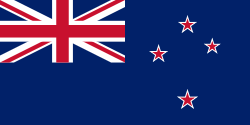| New Zealand at the 1948 Summer Olympics | |
|---|---|
 | |
| IOC code | NZL |
| NOC | New Zealand Olympic and British Empire Games Association |
| Website | www |
| in London | |
| Competitors | 7 (6 men, 1 woman) in 5 sports |
| Flag bearer | Harold Nelson (athlete) |
| Officials | 2 |
| Medals |
|
| Summer Olympics appearances (overview) | |
| Other related appearances | |
New Zealand competed at the 1948 Summer Olympics in London, England. It was their eighth appearance at the Olympics after their debut in 1908. Seven competitors, six men and one woman, took part in eight events in five sports. [1] New Zealand was one of 22 nations that did not win any medals.
